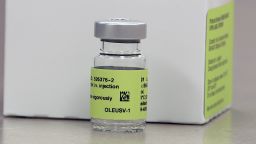In a groundbreaking development, the US Food and Drug Administration (FDA) has granted full approval to Leqembi, an Alzheimer’s drug that has been shown to slow the progression of the debilitating disease. This marks a significant milestone as the first medication targeting the underlying disease process of Alzheimer’s to demonstrate clinical benefit. The Centers for Medicare and Medicaid Services (CMS) has also announced its decision to broaden coverage for Leqembi, offering increased access to an estimated one million individuals with early forms of Alzheimer’s.

Image source- CNN
A Step Forward in Alzheimer’s Treatment
Leqembi, jointly developed by Eisai and Biogen, initially received accelerated approval in January based on its ability to clear amyloid plaque buildups in the brain, a hallmark of Alzheimer’s disease. However, due to restrictions imposed by Medicare coverage, many eligible patients were unable to access the drug, which costs $26,500 per year before insurance coverage. The recent full approval by the FDA, accompanied by the expanded Medicare coverage, is expected to alleviate these barriers and provide hope to those affected by the disease.
Benefits and Limitations of Leqembi
Leqembi has been approved for individuals with early forms of Alzheimer’s, specifically those with mild cognitive impairment or mild dementia, who have confirmed amyloid plaques in their brains. According to estimates by Dr. Lawrence Honig from Columbia University Irving Medical Center, this group constitutes approximately one-sixth of the over 6 million Americans currently diagnosed with Alzheimer’s. It is important to note that individuals with more advanced stages of the disease may not experience the same benefits from the drug and may face increased safety risks.
While Leqembi does not offer a cure, clinical trials have shown that it can slow the decline in cognitive ability and function by 27% over an 18-month period. The Alzheimer’s Association has welcomed the FDA’s approval, emphasizing that the treatment can provide individuals in the early stages of the disease with more time to maintain their independence and engage in activities they enjoy.

image source- the wall street journal
Considerations and Challenges
Despite its efficacy, Leqembi does come with potential side effects and requires regular brain imaging for monitoring purposes. Approximately 13% of participants in the clinical trial experienced brain swelling or bleeding. Certain groups, such as those with specific genetic traits or individuals taking blood-thinning medications, may be at higher risk for these adverse effects. The FDA has included a boxed warning in the drug’s prescribing information to ensure patients and caregivers are aware of these potential risks.
Healthcare systems are preparing to accommodate the broader use of Leqembi, which is administered through intravenous infusion every two weeks. Infusion centers anticipate an increase in patient referrals and are making necessary arrangements to meet the potential surge in demand.
Medicare Coverage and Impact
With the FDA’s full approval of Leqembi, CMS has affirmed its commitment to providing broader coverage for the drug. Medicare recipients will still bear out-of-pocket costs, with traditional Medicare covering 80% of the Medicare-approved amount after meeting the Part B deductible. The coverage details for those enrolled in Medicare Advantage or supplemental plans will depend on the specific policies.
It is important to note that Medicare coverage is contingent upon physicians and clinical teams participating in the collection of real-world evidence through registries. This approach aims to gather data on the effectiveness of the medication and its impact on patients’ health outcomes. While some patient groups and the pharmaceutical industry have expressed concerns about potential treatment barriers created by registries, CMS believes this data collection will contribute to a better understanding of the drug’s benefits and risks over time.
The broader Medicare coverage for Leqembi and similar medications that slow the progression of Alzheimer’s is expected to have a substantial impact on program spending. If 10% of the estimated 6.7 million older adults with Alzheimer’s opt for Leqembi at its list price, it could result in an increase in spending by $17.8 billion, exceeding the total spending on the top 10 Part B drugs administered in doctors’ offices in 2021. This could lead to higher Medicare Part B premiums for all enrollees.
The FDA’s full approval of Leqembi as the first Alzheimer’s drug to slow disease progression represents a significant advancement in the treatment of this devastating condition. The expanded Medicare coverage offers hope to individuals with early-stage Alzheimer’s, granting them more time to maintain their independence and engage in activities they cherish. While the drug is not a cure and has associated risks, its approval paves the way for further research and the development of more effective treatments in the future. The healthcare community and policymakers will continue to monitor the impact of this breakthrough and refine coverage policies to ensure optimal care for individuals living with Alzheimer’s disease.













